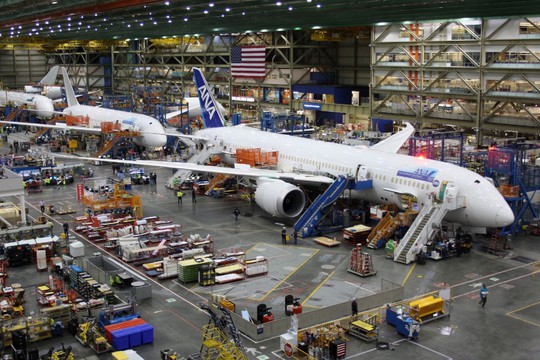While there are widespread reports that Boeing could be facing a potential credit downgrade, some existing company staff are suggesting the American planemaker could file for bankruptcy.
Photo: Simple Flying Images
A generation ago, any list of America’s most admired manufacturers would have had Intel and Boeing near the top. Today, both are on the ropes. Intel has suspended its dividend, slashed jobs and capital spending, and is a takeover target. Boeing has been hobbled by investigations into crashes and a midair mishap, production delays and a strike. A breakup or bankruptcy are no longer unthinkable, ‘The Wall Street Journal’ admits.
In the past five years the combined market value of the two has fallen by half. More than just an ordeal for shareholders, this is a potential disaster for the nation.
Intel and Boeing were once the gold standard in manufacturing groundbreaking products to demanding specifications with consistently high quality. Not any longer. Neither fell prey to cheap foreign competition, but their own mistakes. Their culture evolved to prioritize financial performance over engineering excellence, which also brought down another manufacturing icon, General Electric.
Intel passed on making the chips for Apple’s first iPhone, thinking it wouldn’t be profitable enough. It was late to adopt the latest technology for etching the tiniest circuits, and it missed the boom in artificial intelligence.
Boeing thought it would be cheaper and faster to add more efficient engines to its bestselling 737 with the help of software rather than completely redesign or replace the plane. That contributed to two fatal crashes. Outsourcing of its supply chain and an exodus of experienced machinists during the pandemic contributed to quality problems and delays.
Since their problems are of their own making, it is tempting to leave them to their fates. Investors would likely shrug: Intel is worth less than $100 billion while Microsoft, Apple, and Nvidia are together worth $10 trillion.
The problem: Those tech giants’ software and devices are useless without the advanced semiconductors whose fabrication they contract out, especially to Taiwan Semiconductor Manufacturing Co.If China makes good on its threat to subjugate Taiwan in the coming years, the entire U.S. tech sector could be at Beijing’s mercy.
TSMC is building fabrication plants in the U.S. with the help of $6.6 billion in subsidies from the Chips Act. But it will be years, if ever, before U.S. tech companies are no longer reliant on Taiwan.
Intel is the only U.S.-based company capable of competing with TSMC, and it is struggling to do so.
While Elon Musk’s SpaceX has outclassed Boeing when it comes to space transport, there are no homegrown alternative suppliers of large commercial airliners. Without Boeing, that business would go to Airbus and, eventually, China’s state-owned Comac, which is now delivering its own competitor to the 737 and Airbus’ A320, the C919.
The loss of either company would have industrywide repercussions. Each supports a multilayered ecosystem of designers, workers, managers and suppliers. Once that ecosystem moves offshore, it is almost impossible to bring back.
Rob Atkinson, president of the Information Technology and Innovation Foundation, notes Boeing is the largest U.S. manufacturing exporter, and “is also one of the most engineering-intensive companies in the world, so it is a large R&D spender.” Intel’s failure would deal a body blow to U.S. efforts to shore up the semiconductor ecosystem and reclaim market share from East Asia.
So, much as national leaders would like to ignore these companies’ woes, they can’t. National security dictates the U.S. maintain some know-how in making aircraft and semiconductors.
read more in our Telegram-channel https://t.me/The_International_Affairs

 11:38 05.11.2024 •
11:38 05.11.2024 •























